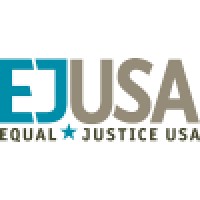
Equal Justice USA
Equal Justice USA (EJUSA) is a national organization working to transform the justice system to one that heals and restores lives. We imagine a justice system that is the solution instead of the problem, and we believe that we won’t get there solely by dismantling the parts of our justice system that are broken. We must also strengthen and scale the elements that work and build the system we want in its place: one that prevents violence, heals trauma, helps people harmed by crime to rebuild their lives, creates genuine accountability instead of mass incarceration, and treats everyone fairly and equitably in the process. Our work includes ending the death penalty, strengthening programs that help crime survivors address trauma and rebuild their lives, and promoting trauma-informed responses to violence that can save lives and help heal communities. We partner with state and local organizations to provide grassroots leaders with the training, leadership development, and support they need to win campaigns and have lasting impact. For more information, visit: http://ejusa.org






